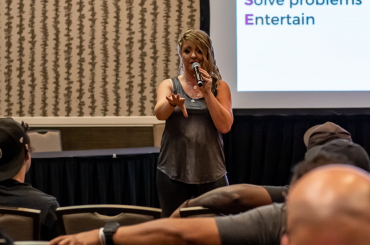In the service economy, customer service is usually the difference-maker—repeat bookings for DJ companies just don’t happen by themselves. If the clients feel like they’ve been treated exceptionally well, that’s the first and most crucial step towards building trust.
Here are some customer-service tips to help build that trust.
What’s your prospect’s first impression?
We all know we shouldn’t judge a book by its cover, but still, we do. A first impression is important because it will linger in a prospect’s memory. What’s the first impression a potential client gets from you? For your prospect, they get it on the phone, in person or through your website. That means you need to be well-spoken, well-dressed, and equipped with a website that doesn’t look like it was built in 1985.
What’s their last impression?
The “goodbye” is an important stage of the customer-interaction cycle, because it, too, tends to linger in a client’s memory. What kind of follow-up do you employ? A thank-you e-card? Or do they simply get on to your email list? Remember, the final impression may be the one that gets you the referral.
Are you user-friendly?
Try this: Go to your website and pretend you’re a potential client. Is it easy to navigate? Or a pain? Similarly, if you’ve got a storefront, come in the front door and see if the door swings open easily, or whacks you on the shoulder.
Is self-service an option for your customers?
Many customers today, especially millennial brides, want conveniences: It’s impossible to be open around the clock, and many people appreciate a downloadable form where they can input their song list or special requests. For wedding customers, they have a lot of other things to tend to while planning their special day, so a form they can fill out—at their convenience—strikes the right customer-service tone.
Do your self-service options include “escape hatches”?
If the downloadable form isn’t working, you need to provide the prospect an easy way to reach a human. Make it obvious, like a “contact us” prompt on your website, or hitting “O” on the phone.
Do your customers have to ask you to answer obvious questions?
Customers would rather not contact you for information that could easily be provided for them on a self-service basis. Do the FAQs on your website include the questions that customers want the answers to? Hint: Go through your customer-service records or phone bank to determine their most asked questions. Don’t rely on your web developer for that. Also, do your prospects get an auto-confirmation when they’ve ordered or downloaded something?
Value the feedback you receive from your customers.
This is information of great value—worth money, actually. It’s what Forbes calls “free customer-service consulting.” What could be better than to get information directly from your customers? It’s like a focus group but better, because it’s rooted in a customer’s real experience with your brand or business. Also: If you’re doing surveys, Forbes recommends you don’t batch surveys and then review them at the end of the month—scan them immediately to see who needs to hear from you now.
Benchmark outside your industry: Your competition is not in the DJ industry.
Your competition is anybody creating experiences for their clients. Clients are comparing their experience with your DJ service to their experience with Nordstrom, or Disney. And the most challenging part of that? They are comparing you—incident to incident, phone call to phone call, web navigation to web navigation.
Commit to improvement.
At the end of every week, ask yourself, “What is the thing I can do next week to make our team better?”
Language matters—and so does listening.
It is extremely easy to say the right thing, but to say it wrong. Also, all of us—DJs and otherwise—can work on our listening skills during a consultation. It’s like a job interview. Allow your clients to talk without you interrupting. Sometimes the clients just want their vision—no matter how chaotic—to be heard. It’s your job to guide and plan with them so they are in great hands with you.
Fight actively–every single day, every single gig–against getting in a rut.
Forbes says the “principle of hedonic adaptation means that your hundredth day on the job, naturally will not be as intense—as exciting, stressful, and so forth—as the first day.”
We’ve all been there. How can you get excited about your 100th wedding? That’s what many DJs need to work on. Is it enough that you have a job that helps people celebrate the happiest days of their lives? Or that, in many ways, you are the facilitator of happiness for so many people.
If you have any questions, please send them to djtimes@testa.com.








